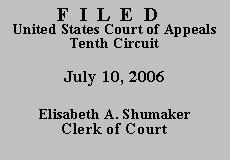

| GEORGIANA MARGARET MONTGOMERY-BROOKS, |
|
| v. | |
| REGIONAL TRANSPORTATION DISTRICT and RANDALL BURNS, |
|
Before HENRY, BRISCOE, and O'BRIEN, Circuit Judges.(**)
The record indicates that, prior to filing this federal case, Ms. Montgomery-Brooks sued the defendants Regional Transportation District and Randall Burns in a Colorado state court, seeking to recover damages for injuries that she sustained when a shuttle bus in which she was riding was hit by another vehicle. Following a bench trial, the state court ruled against her.
For substantially the same reasons as set forth by the district court, we agree that Ms. Montgomery-Brooks's federal court claims are barred by claim preclusion and the Rooker-Feldman doctrine.
As to claim preclusion, we note that under Colorado law, "[f]or a claim in a second judicial proceeding to be precluded by a previous judgment, there must exist: (1) finality of the first judgment, (2) identity of subject matter, (3) identity of claims for relief, and (4) identity or privity between parties to the actions." Argus Real Estate, Inc. v. E-470 Pub. Highway Auth., 109 P.3d 604, 608 (Colo. 2005). The first, second and fourth elements are clearly satisfied here. The state court entered a final judgment, and Ms. Montgomery-Brook's causes of action in this lawsuit arise out of the same accident for which she sought damages in state court. The defendants in this federal case were also named as defendants in the state court case.
As to the third element--"whether there exists identity of claims for relief," we note that it "is bounded by the injury for which relief is demanded, and not by the legal theory on which the person asserting the claim relies." Id. at 608-09. "Thus, claim preclusion bars relitigation not only of all claims actually decided, but of all claims that might have been decided if the claims are tied by the same injury." Id. at 609 (internal quotation marks omitted). Accordingly, even though Ms. Montgomery-Brooks has asserted a claim in this federal case that she did not assert in the state court case (seeking benefits under a Colorado statute), that claim could have been asserted in the state court case. Accordingly, the third element of claim preclusion is satisfied as well.
As to the Rooker-Feldman doctrine, we note that Ms. Montgomery-Brooks herself has characterized this action as an appeal of the state court ruling. See Aplt's Br. at 3; Aplt's Reply Br. at 16. The Rooker-Feldman doctrine provides that federal district courts lack jurisdiction over "cases brought by state-court losers complaining of injuries caused by state-court judgments rendered before the district court proceedings commenced and inviting district court review and rejection of those judgments." Exxon Mobil Corp. v. Saudi Basic Indus. Corp., 544 U.S. 280, 284 (2005). Thus, to the extent that she is appealing the state court judgment, Ms. Montgomery-Brooks's claims are also barred by the Rooker-Feldman doctrine.
Accordingly, Ms. Montgomery Brooks has failed to advance a reasoned, nonfrivolous argument in support of reversing the district court's dismissal of her action. See DeBardeleben v. Quinlan, 937 F.2d 502, 505 (10th Cir. 1991). We therefore DENY her motion to proceed in forma pauperis and DISMISS this appeal.
Robert H. Henry
United States Circuit Judge
*. This order and judgment is not binding precedent, except under the doctrines of law of the case, res judicata, and collateral estoppel. The court generally disfavors the citation of orders and judgments; nevertheless, an order and judgment may be cited under the terms and conditions of 10th Cir. R. 36.3.
**.After examining the briefs and appellate record, this panel has determined unanimously that oral argument would not materially assist the determination of this appeal. See Fed. R. App. P. 34(a)(2); 10th Cir. R. 34.1(G). The case is therefore ordered submitted without oral argument.